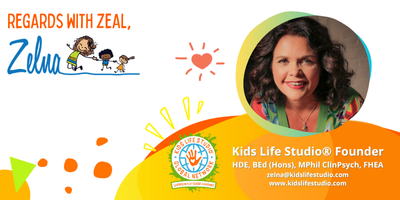Rethinking how we understand labels in childhood as Kids Life Coaches

In professional settings such as schools, clinics and therapy rooms, we often hear children described with shorthand labels: “bipolar,” “ADHD,” “oppositional,” “anxious.” These labels can feel useful. They allow adults to communicate quickly, allocate resources, or structure interventions.
But here’s the question few stop to ask: do labels help children, or do they help adults manage our own uncertainty?
Labels simplify complexity at a cost
A label provides a tidy story. It offers certainty where there is none. But children are not tidy. They are dynamic systems — biological, emotional, and social — interacting with the world in ways that are constantly changing.
The danger of labeling a child lies in the feedback loop it creates. Once a child is given a diagnostic label, every behaviour can be interpreted through that lens. Adults may unconsciously expect the behaviour to continue, and the child may internalise the label as part of their identity. The result? A self-fulfilling prophecy.
Behaviour is communication
Consider the child often described as “aggressive” or “oppositional.” Viewed through a label, interventions focus on control, correction, or compliance. Viewed differently, the same behaviours are signals of unmet needs: dysregulation, trauma, sensory overload, or relational distress.
Neuroscience tells us that children’s brains are highly sensitive to environment and relationships. The prefrontal cortex — responsible for decision-making, emotional regulation, and social behaviour — is not fully developed until the mid-20s. Stress, fear, or lack of attuned connection will manifest as behaviours adults might misinterpret as pathology.
When coaching children, I always shift from applying labels to decoding the message behind behaviour. This means my play based interventions show parents how to shift: from punishment to support, from compliance to connection, from isolation to inclusion.
Labels are not neutral
A diagnosis carries authority and weight. In some contexts, this can unlock resources or access to support and that can be life-changing but when the label becomes shorthand for a child’s identity, we risk:
-
Oversimplifying their lived experience.
-
Ignoring underlying trauma, stress, or unmet needs.
-
Shaping expectations and opportunities prematurely.
-
Reducing the child to a “problem” rather than a person in development.
Labels are best used as a tool, not a definition. They should guide understanding, not replace it.
A relational approach
Educated practitioners, parents, and certified life coaches for children know that insight matters more than convenience. The question we must ask is not, what is the child?, but what has happened to the child, and what does the child need right now?
A Play Based Coaching approach:
-
Prioritises observation over assumption — seeing patterns without rushing to categorise.
-
Interprets behaviour as communication rather than pathology.
-
Treats labels as temporary descriptors, not identities.
-
Aligns interventions with developmental science, attachment research, and relational neuroscience.
Case in point
Recently, I worked with a child labelled as “bipolar.” Traditional approaches focused on medication and behavioural control, but when we looked at the child’s history and nervous system, patterns of trauma emerged as the root cause. Behaviour that once seemed inexplicable became a language of survival. By shifting the lens from label to relationship, we could intervene in ways that actually supported the child’s development, resilience, and wellbeing. Join me this Thursday if you are a membership coach or premium student for a professional development session around this case study.
Where to from here as a Kids Life Coach?
Labels are useful, but only when handled with caution. They are for things, not kids. They should never replace curiosity, observation, and the relational work that helps children thrive and especially not when coaching children.
For Kids Life Coaches committed to meaningful change, the insight is clear: start with understanding, not categorisation. Start with the child, not the label.
Because children are not problems to be solved. They are humans to be understood.


